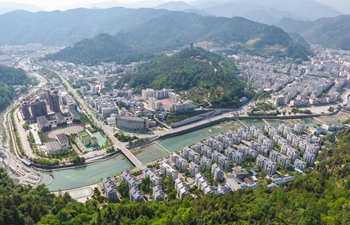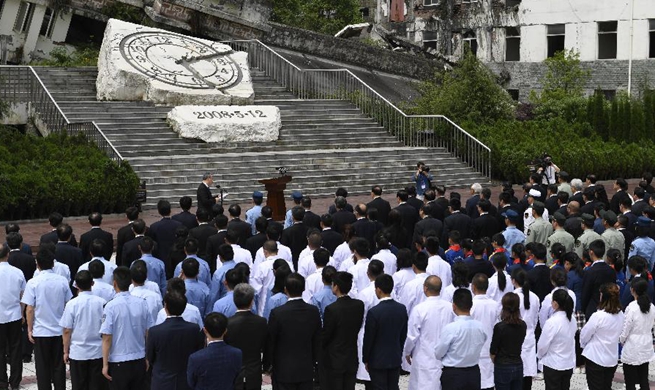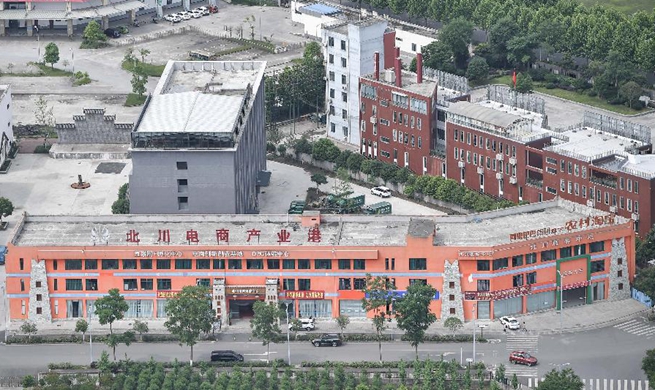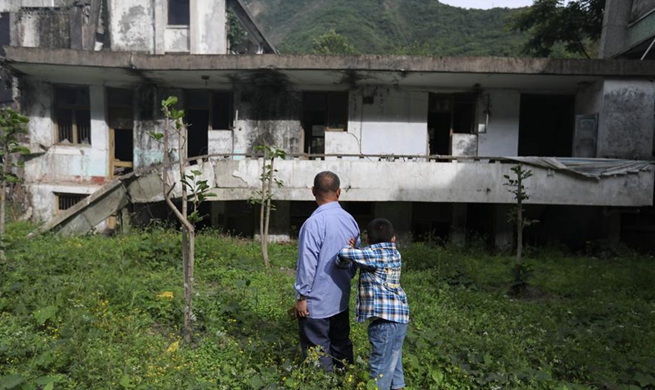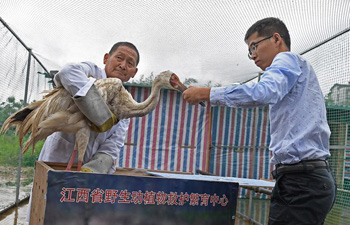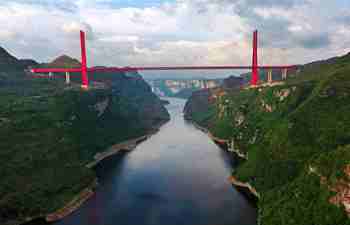ANKARA, May 12 (Xinhua) -- Turkey is set to receive its first F-35 aircraft, world's most advanced fighter jets, despite an initiative launched by U.S. senators to block the delivery amid faltering relations between Turkey and the United States.
Defense sources close to the project told Xinhua that the first F-35 will be delivered to the Turkish Air Force on June 21 in the United States where a ceremony will take place.
"This plane will be deployed at Eglin air base in Florida, U.S. for a year where Turkish pilots will get training," said Ozgur Eksi, a senior analyst with the Istanbul-based C4 defence magazine.
Several batches would comprise some 20 other jets which are expected to be delivered gradually until 2022.
The F-35 fighter jet is being developed and built by U.S. defence contractor Lockheed Martin for the United States, Britain, Australia, Italy, Norway, Turkey, the Netherlands, Denmark and Canada in a project worth about 400 billion U.S. dollars, making it the world's most expensive weapons program.
A total of 3,000 F-35 jets are to go into service around the world in coming years.
Now, two Turkish Air Force pilots are getting special training in the United States, Anadolu Agency reported citing defense sources.
After the training is completed and another warplane is delivered, the F-35 jets are planned to be brought to Turkey in September 2019. The trained pilots will fly the two F-35 jets accompanied by a refuelling plane.
Meanwhile, a number of U.S. congressmen have urged the Trump administration to suspend the procurement because of Turkey's decision to buy Russian S-400 advanced air defence systems.
"If they take such a step at a moment when we are trying to mend our bilateral ties, they will definitely get a response from Turkey," Turkish Foreign Minister Mevlut Cavusoglu told private broadcaster CNN Turk in an interview last week.
In 2014, Turkey placed an order for the first two F-35 jets for the projected fleet of 100 F-35A aircraft and plans to deploy the aircraft by 2019.
The F-35 jets are planned to be deployed at the 7th Main Jet Base Command in Turkey's eastern Malatya province, located at the southern borders of Turkey with Iran, Iraq and Syria.
The F-35 jets will replace Turkey's aging fleet of F-4 and F-16 aircraft. Last December, the Pentagon said Italy and Turkey would provide the initial heavy maintenance of the F-35 fighter jets and their engines.
Turkey is still in negotiations to purchase 16 vertical landing type aircraft.
In terms of industrial participation, the Turkish defence industry plays an important role in the program as a parts supplier for the F-35 program.
Ten Turkish firms, including Aselsan, Kale Aviation, Roketsan, and Turkish Aerospace Industries, are involved in the production of parts and electronic systems and the engine maintenance for F-35.
U.S. senators have introduced a bill calling on President Donald Trump's administration to exclude Ankara from the program, citing the country's human rights records and the fact that an evangelical pastor, Andrew Brunson, is still jailed there and tried for "espionage" and "terrorism" charges after the botched military coup of July 2016. He faces up to 35 years in prison.
Ties between the United States and Turkey have soured dramatically over rival stances on the war in Syria and Washington's refusal to extradite cleric Fethullah Gulen to Turkey over his alleged role of masterminding the failed coup.
Tensions have risen further over Turkey's soon expected purchase of Russian S-400 defense system, worrying NATO partners and Washington alike. The multi-billion-dollar deal could eventually lead to the U.S. placing sanctions on Turkey to which Ankara has wowed to retaliate.
Washington imposed an arms embargo on Turkey following the Turkish invasion of northern Cyprus in 1974, a military operation which was in response to a Greek coup to annex Cyprus to Greece.
Ironically, this embargo pushed Turkey to develop its own defense industry over the years, diminishing considerably its dependence on foreign countries.
Experts believe that blocking F-35 delivery to Turkey will eventually cause the collapse of the whole massive project because important parts of the aircraft such as the central fuselage are manufactured in Turkey.
"The U.S. will shoot itself in the foot, it would definitely harm the entire project," argued Ozgur Eksi.
Observers have argued that if the U.S. administration imposes military sanctions on Turkey, it would enhance the country's already extensive cooperation with Russia and push Ankara towards Moscow's influence sphere.







